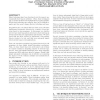1418 search results - page 25 / 284 » How to Explain Mistakes |
ECAI
2006
Springer
14 years 3 days ago
2006
Springer
Abstract. Computational Game Theory is a way to study and evaluate behaviors using game theory models, via agent-based computer simulations. One of the most known example of this a...
ILP
2007
Springer
14 years 2 months ago
2007
Springer
A recurrent question in the design of intelligent agents is how to assign degrees of beliefs, or subjective probabilities, to various events in a relational environment. In the sta...
OOPSLA
2004
Springer
14 years 1 months ago
2004
Springer
Many techniques have been developed over the years to automatically find bugs in software. Often, these techniques rely on formal methods and sophisticated program analysis. Whil...
IWSAS
2001
Springer
14 years 27 days ago
2001
Springer
The subject of this paper is a Smart Spell Checker System (SSCS) that can adapt to a particular user by using the user’s feedback for adjusting its behavior. The result of the ad...
COLT
1997
Springer
14 years 18 days ago
1997
Springer
The problem of learning linear discriminant concepts can be solved by various mistake-driven update procedures, including the Winnow family of algorithms and the well-known Percep...

